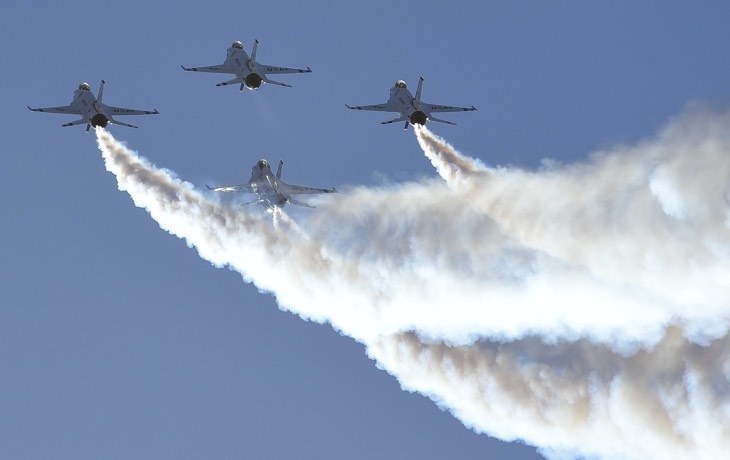The pandemic has been undeniably isolating, causing people across the world to realize the power of congregating in large groups for a cause. Since this is now too risky, traditions across the globe have emerged as people seek to connect, to honor healthcare workers, and to just feel part of the human race again. Doctors and nurses have been working long and dangerous shifts, only to be met with political opposition and protest, but some initiatives and movements have sought to publicly express gratitude to them in a big way.
Howling in the West
For a few minutes each night at 8 pm, people in the western United States literally go outside and howl like coyotes. If the member count of a popular howling Facebook group can be trusted, somewhere around 583,000 people have been howling from their homes since the pandemic began. But howling is also a time-honored tradition in the western united States. The hashtag #howlat8 has gone viral way beyond this group, with close to 100 countries joining in the fun.
One proud grandma posted about her daughter, who contracted COVID-19 and bravely delivered her twins via emergency c-section, and had to wait four days to meet them. “Tonight I WILL howl for my bad a** daughter…” she posted. Colorado Gov. Jared Polis has encouraged the howling, posting on his Facebook page an emoji of a coyote and reminding everyone in Colorado to “howl for the frontline workers across our state.”
“I heard a riot of howls from around our neighborhood,” one front line worker told a Waco-Tribune columnist. “I want each of you howlers to know that your support helped lift the tired heart and soul of someone who somedays wonders if what I did was enough. Last night it brought a tear to my eyes and a big lump in my throat. It is a pleasure to be your neighbor, and an honor to help support our community.”
Support from the skies
Flyovers from military bases around the country have proven to be one of the most socially distant ways to honor those working on the front lines of the pandemic. In late April, health care workers gathered on rooftops in New York City, one of the hardest hit by the pandemic with over 20,000 deaths reported, as the Navy’s Blue Angels and the Air Force’s Thunderbirds flew in a “collaborative salute” according to NPR.
Since then, the Thunderbirds have done what they called #AmericaStrong salutes across the country.
The flyover of San Diego & LA was our final mission for #AmericaStrong and was dedicated to the frontline responders battling COVID-19 in California. Their hard work is truly appreciated.
It was also an honor to salute frontline heroes across the nation with the @BlueAngels. 🇺🇸 pic.twitter.com/aF6kK5yYyO
— Thunderbirds (@AFThunderbirds) May 17, 2020
Not all attempts at flyovers went as well. JetBlue is experiencing a public relations nightmare after suggesting they send low-flying jets through New York City, which some New Yorkers found to be more than insensitive and inappropriate after the 9/11 attacks.
Additional smaller flyovers have taken place in many states, such as a National Guard organized event in Cincinnati, OH and Northern Kentucky in early May. The Ohio National Guard’s 180th Fighter Wing told WLWT that “it is honored to extend a salute to Ohio health care workers, first responders, military members and other essential personnel as a small thank you for helping to keep Ohioans safe.” Over 15 hospitals’ workers were able to see the flyovers.
Taking to the streets: Singing, clapping, sirens, lights, and banging
Dr. Giuseppe Aragona, a general practitioner based in Bolton, UK hears the nation participating every Thursday night in “Clap for the Carers,” in which citizens applaud the National Health Service Doctors, nurses, cleaning staffs, and other frontline workers.
“It’s moved me because as a doctor I’ve always received recognition from the public, patients, and families of patients,” said Dr. Aragona. “However, nurses and in particular cleaners never get any recognition for the important jobs they are doing. Finally, they are getting the plaudits and thanks that I think they have always deserved. I can’t do my job without the support from all of these so it has pleased me greatly to see the public clap in recognition on their doorsteps every Thursday.”
Many cities now have established times for everyone to get outside and make some noise (or music, if you are a bit more talented) in support of health care workers. New Yorkers bang on pots and pans every evening, and even the UK Prime Minister has been out for the clapping hour.
Tear-jerker videos have emerged from Europe throughout the epidemic of musicians taking to the streets to draw people out of their houses onto balconies, rooftops, and to open windows as they unite in song. The pandemic, and the celebrations, know no bounds and have served to unite us all, and to acknowledge those working hard and suffering.
At Madison hospital in Alabama in early April, firefighters and police officers lit up the streets with sirens and lights, and raised the ladder on the firetrucks in support of workers. In Harlem, a neighborhood honored workers with one tambourine and a chorus of voices singing “This little light of mine,” followed by clapping.
In a stunning (less noisy) tribute to health care workers in Brazil, the famous Christ the Redeemer statue was illuminated with the image of a doctor’s outfit, with the words “thank you” lit up in multiple languages. The statue then projected real images of health care workers followed by a “stay at home” plea.
The common threads across the world have been simple: making some noise, whether with howls, songs, or a simple wooden spoon and pot, gives back to healthcare workers just a fraction of what they are giving us.


You are reporting the comment """ by on